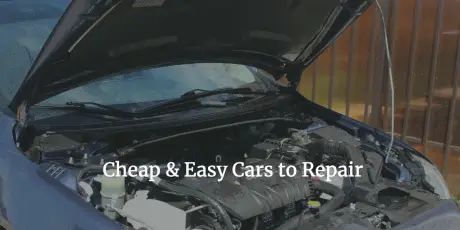
When it comes to owning a car, one of the most common concerns among buyers is the potential cost of maintenance and repairs. Some cars can burn a hole in your pocket the moment something goes wrong, while others can be both a breeze to fix and easy on the wallet.
If you're involved in a collision or your car is damaged in an unexpected natural event, having the right auto insurance can make the actual cost of repairs irrelevant. However, there are many other reasons a car may need to be repaired, including regular wear and tear. In this article, we'll delve into which cars are the easiest and cheapest to repair, and why.
What Makes a Car Easy and Cheap to Repair?
When determining the ease and cost-effectiveness of repairing a car, several factors come into play. One of the most influential factors is the car's popularity. When a particular model enjoys high sales numbers and has been on the market for an extended period, its replacement parts tend to be more readily available.
This wide availability of parts can significantly drive down their price, as there are more manufacturers producing these parts, leading to competitive pricing. Moreover, a popular car means more mechanics are familiar with its common issues and quirks, which can translate to faster and potentially cheaper service.
Another vital aspect is the simplicity of the car's design. Cars that have been designed without excessive electronic components or intricate systems are generally easier to diagnose and repair.
For instance, older models or cars that prioritize basic functionality over high-tech features can often be mended with standard tools and without specialized equipment. This simplicity can speed up the repair process, which, in turn, can reduce labor costs.
The brand reputation is also crucial. Some car manufacturers are renowned for producing vehicles that last a long time without needing major repairs. Brands that consistently produce reliable vehicles often have tried-and-true designs that avoid common pitfalls or known issues present in other cars.
Investing in a car from a brand with a strong reputation for reliability can often lead to fewer unexpected repair costs down the line.
Lastly, the presence of a robust community and support system can't be underestimated. Cars that have enthusiastic and dedicated communities—think classic cars or specific beloved models—often have a wealth of resources available to their owners.
These can range from extensive DIY guides to active online forums where users share tips, advice, and their experiences. Such shared knowledge can make diagnosing issues easier and provide insights into cost-effective repair solutions.
Cars Known for Being Easy and Cheap to Repair
1. Toyota Corolla

Why It's Great: The Toyota Corolla has been a top-seller worldwide for years. Its reputation for reliability precedes it. Even if a repair is needed, the Corolla's popularity ensures parts are abundant and often affordable.
2. Honda Civic

Why It's Great: Another worldwide favorite, the Honda Civic is renowned for its durability. There's also a vast online community, which means you can often find DIY repair guides or forums to help diagnose and fix problems.
3. Ford Focus

Why It's Great: While there have been certain year models with transmission issues, the Ford Focus, especially older versions, is generally easy to work on. Its abundant parts make repairs reasonably priced.
4. Chevrolet Silverado

Why It's Great: This pick-up truck is as tough as they come. Its design is fairly straightforward, making most mechanical repairs relatively simple for those who have some automotive know-how.
5. Mazda3

Why It's Great: The Mazda3 combines fun-to-drive aspects with the ease of repair. They're common enough that finding parts isn't a hassle, and the car's design doesn't usually present too many challenges for mechanics.
6. Subaru Outback

Why It's Great: Known for its ruggedness, the Subaru Outback often lasts for hundreds of thousands of miles. They have a tight-knit community of enthusiasts who often share repair tips and tricks.
Tips for Keeping Repair Costs Down
● Regular Maintenance. It may sound obvious, but regular check-ups can prevent more significant, more expensive issues down the line.
● Learn Basic Repairs. With the help of YouTube and car forums, learning how to change your oil, replace air filters, or change brake pads can save you money.
● Shop Around. If you don't have a regular mechanic, get quotes from several places before committing to a repair.
In Conclusion
While this list isn't exhaustive, it gives an idea of the kind of cars that tend to be easier and cheaper to repair. Of course, individual experiences can vary based on factors like geography, luck, and how a car is treated. However, opting for vehicles with robust reputations, available parts, and supportive communities can often lead to lower repair costs and less frequent trips to the mechanic.
Same articles

Understanding Vehicle Inspection and Verification Services: Why They Matter for Every Driver
GuidesVehicle inspection and verification services are an essential but often overlooked part of keeping roads safe and cars legally compliant. Most people only think about inspections when it’s...
KLIFEX Brand Overview: High-Quality Automotive Repair Kits for Affordable Repairs
GuidesThe automotive aftermarket has long needed solutions that combine reliability, durability, and affordability. Many car enthusiasts and services are looking for a way...
Fast, Reliable Vehicle Emissions & Inspection Services Made Simple
GuidesFast, reliable emissions and inspection services are essential for keeping vehicles road-ready, compliant with environmental regulations, and safe for daily driving. If you’re looking for quick...

